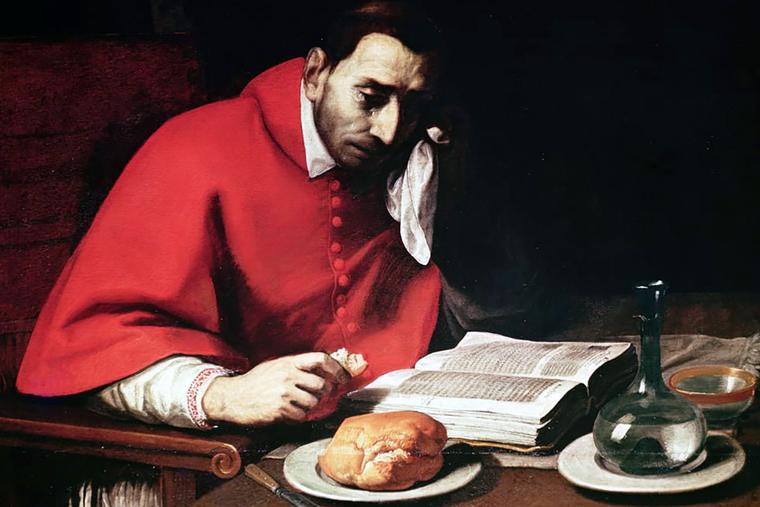Being in the Black Spiritually: The Gift of the Black Fast
A period of strict fasting during Lent and the Paschal Triduum fosters a spirit of renewed commitment to God — a sorrowful heart intent on making amends.

The Black Fast, also known as a strict fast, is an ancient form of Christian penance. Those undertaking a Black Fast consume no food during the day, although water is permitted. A single, modest meal is allowed at sunset. No meat, eggs, dairy products or alcohol.
This was de rigueur throughout Christendom prior to the eighth century A.D. Currently, some Catholics observe the Black Fast on Ash Wednesday and Good Friday and indeed all of the Fridays of Lent. Some will practice the Black Fast on Wednesdays — a traditional penitential day to remember Judas’ betrayal of Christ and again on Fridays to mourn Christ’s death.
Historically, many Christians fasted in this way throughout Lent. Traditionally, ordinandi similarly kept the Black Fast on the days before their priestly ordination. Many monks and cloistered nuns still do so and the great saints all recommend it — and they should know, because they are about their Father’s business.
Some devout and hearty Christians will, in addition, to the Lenten Black Fast, also fast for 40 straight hours ending at Easter Mass. This fast, which is even stricter than the Black Fast, still allows for water and medication as necessary. Alternatively, an equally valid and traditional option is to fast for 40 hours starting with the end of Holy Thursday Mass.
If you plan to attend the Easter Vigil Mass scheduled for midnight, for instance, you would refrain from eating starting 4:00am on Good Friday.
The Black Fast is exemplified by:
- During Holy Week, the Lenten supper meal consists exclusively of bread, salt, herbs and water.
- No alcohol
- No lacticinia (i.e., milk, butter, cheese, yogurt, ice cream)
- No meat or eggs
- Only one modest meal per day is permitted. No second helpings. And only after sunset.
Those participating in the Black Fast are allowed only bread, water and vegetables for our single, simple meal in the evening during the Black Fast. I would include all stimulants in this strictly verboten list, including tobacco and chewing gum, as they would dull the very hunger for which we’re striving.
It’s important to remember that the Black Fast or, indeed, any spiritual practice, isn’t a competition, a slog, or a “wink-and-a-nod” to God. It is a time of joy and opportunity. As Christ tells us:
And when you fast, do not put on a sad face as the hypocrites do. They neglect their appearance so that everyone will see that they are fasting. I assure you, they have already been paid in full. When you go without food, wash your face and comb your hair, so that others cannot know that you are fasting — only your Father, who is unseen, will know. And your Father, who sees what you do in private, will reward you. (Matthew 6:16-18)
Fasting should be accompanied by prayer, penance, almsgiving, confession, spiritual reading and service to others marked with a spirit of joy. It’s a spirit of renewed commitment to God — a sorrowful heart intent on making amends.
It’s too easy to just “go through the motions” and wait out the time but this would be a sad turn of events and a wasted opportunity. After all, 70 years is all we have — perhaps 80 or 90 years, if we are strong. Yet they bring us trouble and sorrow, then life is over and we are gone (Psalms 90:10).
We who are alive have been given a great gift and opportunity in existing. We are sempiternal beings — with a definite beginning but without end. Our lives are given to us to prepare us for all eternity. The exact location and situation of that eternity is up to us.
Is a 40-hour black fast annoying? Inconvenient? Bothersome? Without a doubt! Let us then not waste these moments. As Paul reminds us, keep an eye on the prize, which is God's call through Christ Jesus to the life above (Philippians 3:14).
The Black Fast is our great gift to God. What else can we get the One who already has everything?
Listen, My people, and I will speak; I will testify against you, Israel. I am God, your God. I do not reprimand you because of your sacrifices and the burnt offerings you always bring me. And yet I do not need bulls from your farms or goats from your flocks; all the animals in the forest are mine and the cattle on thousands of hills. All the wild birds are mine and all living things in the fields. ‘If I were hungry, I would not ask you for food, for the world and everything in it is mine. Do I eat the flesh of bulls or drink the blood of goats? Let the giving of thanks be your sacrifice to God, and give the Almighty all that you promised.’ (Psalm 50:7-14)
It’s often said, “A moment on the lips, a lifetime on the hips.” If this is so, then let us also remember that we can choose to indulge in that third bear-claw donut we really didn’t need or we can offer it and all the donuts at our disposal to those who would find that momentary pleasure a great relief. Recall St. Basil the Great’s advice:
The bread in your cupboard belongs to the hungry; the coat unused in your closet belongs to the one who needs it; the shoes rotting in your closet belong to the one who has no shoes; the money which you hoard up belongs to the poor.
Do not dread fasting. Look forward to the opportunity to give God something he would really like. It’s much better than giving him a tie…
For more information, see the article The Black Fast in the Catholic Encyclopedia.

















